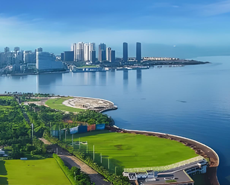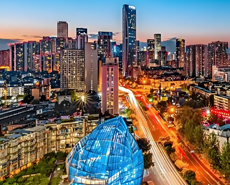
Hydrometallurgical process injects vitality to antimony market
----Interview with Xiaochun Chen
General Manager
Xinshao Chenzhou Antimony Co., Ltd.
General Manager
Xinshao Chenzhou Antimony Co., Ltd.
Xinshao Chenzhou Antimony Co., Ltd. (hereinafter referred to as Chenzhou Antimony) was founded in 1966 as a county-owned enterprise located at No.138, Daxin Street, Niangxi Town, Xinshao County with the former name of Xinshao County Smelting Plant. As a wholly-owned subsidiary of Hunan Xinlong Mining Co., Ltd. and a subordinate company of Hunan Gold Group, Chenzhou Antimony emphasizes technological innovation and high-quality development, adheres to the principles of "truth, innovation, efficiency and development", assumes the responsibility of a state-owned enterprise and actively explores ways for transformation and upgrading. In March 2012, the company's technology research team conducted a new antimony hydrometallurgical process test to replace the original pyrometallurgical smelting slurry electrolysis process in refined antimony production together with the Beijing General Research Institute of Mining & Metallurgy. The two parties carried out high-arsenic antimony-gold concentrate slurry electrolysis tests of small, medium and industrial production scales and achieved good results. In September 2013, Chenzhou Antimony passed the scientific and technological achievement appraisal organized by China Nonferrous Metals Industry Association. All the relative experts believed that the technology and equipment of the project were the first of this kind both at home and abroad and could be considered as a major innovation in the world's antimony smelting technology area with both the process and technology reaching the world's leading level. Chenzhou Antimony won the Best Breakthrough Award issued by the China International Gold Conference in September 2014, the First Prize for Scientific and Technological Progress in Shaoyang City in December 2017 and the title of National High-Tech Enterprise in October 2018.
Asian Metal: Hello, Mr. Chen! Could you give us a brief introduction of your company and your main business?
Mr. Chen: Chenzhou Antimony, a company once named Xinshao County Smelting Plant, was founded in 1966. Our new plant, built by Hunan Shaping Building Co., Ltd., is located in Tangkou Industrial Park in Xinshao Economic Development Zone. Covering a total area of about 166,667 meters, which includes a building area of 22,800 square meters, Chenzhou Antimony is now a wholly-owned subsidiary of Hunan Xinlong Mining Co., Ltd. and a subordinate company of Hunan Gold Group. Focusing on antimony metal and gold business, Chenzhou Antimony can process about 12,000t of antimony metal and produce about 500kg of gold per year currently. We formally put our Antimony Acidic Hydrometallurgical Process Project (Phase One) into commercial operation in February 2021, which made us become China's first company that can smelt antimony using this process. In addition, we applied for relevant patents on this process.


Asian Metal: We're glad to hear that your company just put the Antimony Acidic Hydrometallurgical Process Project (Phase One) into commercial operation in early 2021, so could you please briefly introduce to us the process and its advantages compared with the traditional pyrometallurgical process?
Mr. Chen: Yes, we formally put our Antimony Acidic Hydrometallurgical Process Project (Phase One) into commercial operation on February 27th. With a total investment of RMB360 million(USD55.21 million), the project covers 170,000 square meters and has designed production capacities of 40,000tpy of high-arsenic antimony-gold concentrate, 10,000tpy of antimony metal and 26,000tpy of gold concentrate. The construction of the project is divided into two phases. The phase one project, with a total investment of RMB250 million(USD38.34 million), can produce 5,000t of antimony per year; the phase two project, with a total investment of RMB110 million (USD16.87 million), can produce 10,000t of the material per year. There are four major advantages of the Antimony Acidic Hydrometallurgical Process. Firstly, it can ease the pressure of environmental protection as it is able to effectively solve the problems of antimony arsenic separation and the emission of waste gas, waste water and waste slag caused by the traditional pyrometallurgical process. Secondly, it can conserve energy as it consumes electricity, natural gas and other clean energy rather than traditional coking coal. Thirdly, it can effectively improve surrounding environment, realize clean and environment-friendly production and ease air pollution caused by pyrometallurgical arsenic. Fourthly, it helps improve the recovery rate of gold and antimony to 98% respectively.
Asian Metal: Please share with us your opinion about the reform and development of domestic antimony smelting process in the future?
Mr. Chen: Under the background of carbon neutral, China gradually enhances its requirements on smelting plants and the traditional pyrometallurgical process will be faced with great challenges in environmental protection as well as energy conservation and emission reduction. Our acidic hydrometallurgical process has overturned the traditional smelting process in many aspects. By effectively solving the problems of antimony arsenic separation and the discharge of waste gas, waste water and waste slag, our new process can effectively raise the recovery rate of antimony metal from around 80% to 98%, which is what the pyrometallurgical process can't do. Meanwhile, our new process can help reduce the smelting cost of antimony by about 1.5% to some extent, which is considered as a great breakthrough in the development of antimony smelting process.


Asian Metal: What impact will the two kinds of metallurgical processes have on antimony ingot production and supply in China in your opinion?
Mr. Chen: Our company totally has eight production lines for refined antimony, and six of them have been put in pilot production so far. We expect to process around 12,000t of antimony ore in 2021 and plan to produce about 4,500t of refined antimony and about 450kg of gold during the year. Our antimony acidic hydrometallurgical process is still in pilot stage now and we can produce one furnace of refined antimony in three days by the new process under normal production, but have to spend four-five days on doing this by pyrometallurgical process, which indicates that the new process improves the antimony output efficiency to some degree. In addition to the major breakthrough made in environmental protection, the new process can also enhance the recovery rate of gold to over 98% as it can produce gold-free cathode antimony.
Asian Metal: We learned that the supply shortage of antimony resources leads to the increase in antimony ingot prices in China, so what is your opinion about the producing status of domestic antimony mines as a company owning gold-antimony mines?
Mr. Chen: The supply of antimony resources remains tight in China currently as domestic antimony mines still keep insufficient operating rates. The substantial increase of antimony product prices as well as the effective control of the spread of COVID-19 stimulated domestic small and medium-sized mines to raise their operating rates to some extent in early period of this year. The operating rates of Chinese small and medium-sized mines are likely to rise from 50% in 2020 to 70% in 2021, but due to great pressure from environmental protection, safety and policy, these mines keep low output ratio and the quality of their products is uneven. We expect that the antimony concentrate supply in China would increase slightly YOY in 2021, but still can not meet the demand of domestic antimony product smelters. As for the import, statistics from China Customs indicated that China imported 42,765t of antimony concentrate in 2020, down by 25.68% YOY. We forecast that the imports of the raw material would be less than 50,000t throughout 2021, so it would be hard for the supply shortage of the raw material to be eased in short term affected by decreased imports.

















